Do people yet to be born have climate change rights?
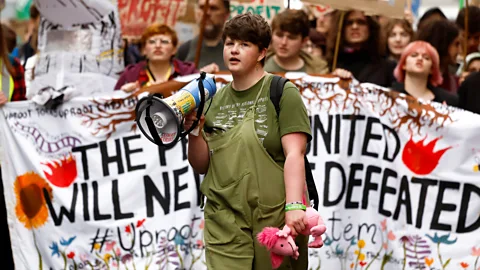 Jeff J Mitchell/Getty Images
Jeff J Mitchell/Getty ImagesThere are some who believe we should be taking future generations more into account in how we act on climate today.
Seven years ago, Sophie Howe became the world's first ever future generations commissioner. Tasked to be the guardian of the interests of future generations in Wales, she was made responsible for giving advice on long-term thinking to the Welsh government – including on climate.
It's a role that at once both makes sense and raises a host of difficult questions. How on Earth can someone manage to represent people who will be born in five, 50 or 100 years, for example? "I always say that I sort of represent the unborn but they don't talk to me very often," says Howe. "It's impossible for us to know exactly what future generations are going to need."
That doesn't mean we shouldn't try, however. As climate impacts begin to bite, and are only set to get worse as time goes on, governments, societies, philosophers and young people are finding themselves tasked more and more to consider how the wellbeing of the billions of people who will live in the future can be accounted for in decisions today.
It turns out there are many different ways to bring the influence of our descendants into present-day climate action, from new approaches to legal cases and citizen assemblies to future generations commissioners like Howe, and revisiting traditional ways of thinking for the long-term.
A commissioner for your great-great-great-grandchildren
Climate change and the intergenerational issues around it are of course just one part of a much larger picture of long-term risks that face the world, from the threat of nuclear war to technological risks associated with artificial intelligence or biological weapons to long-lasting social issues such as racial injustice, says Roman Krznaric, a philosopher and author of The Good Ancestor.
However, "the one thing we know about the climate crisis is that it has incredibly long-term impacts", he says. "That's the core of the intergenerational climate problem: we've colonised the future, we treat it as a dumping ground for ecological degradation, and technological risks, as if there was nobody there."
We also know that billions upon billions of people will inhabit the future, "even though they have no political voice, no political representation", he says. "Our politics hasn't been designed to give those generations who will be impacted by our climate actions any kind of voice in the system."
The wellbeing of future generations act passed in 2015 by the Welsh government (a devolved administration within the UK) is one effort to address this.
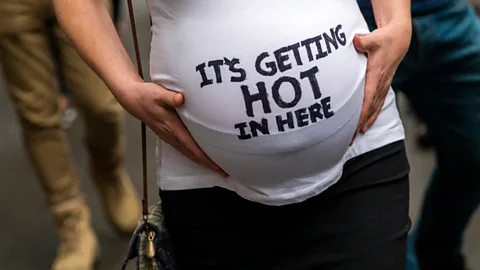 Jenny Evans/Getty Images
Jenny Evans/Getty ImagesThe act puts into statute a requirement for all public bodies – from health boards and local authorities to the Welsh government itself – to demonstrate how their decisions are meeting today's needs without compromising the ability of future generations to meet their own needs.
What is sustainability?
The concept of "sustainability" goes back to at least 18th-Century Germany, although many sustainable practices have been around for thousands of years. In 1987, the UN's Brundtland Commission, which oversees sustainable development, defined sustainability as "meeting the needs of the present without compromising the ability of future generations to meet their own needs", a commonly used definition.
In other words, they have to demonstrate how their decisions are supporting "sustainability" – in the classic sense, rather than the buzzword.
The law establishes seven long-term national wellbeing goals with set statutory definitions, including a prosperous Wales, a healthier Wales, a more equal Wales, a globally responsible Wales and a resilient Wales (this latter includes ecological resilience).
The job of the future generations commissioner, says Howe, is to support public bodies to reach these goals, monitor and review their progress, and issue recommendations. There's no obligation to follow their recommendations, although bodies do have to respond to explain why they aren't.
Howe has largely focused on big strategic policy issues, such as her intervention on the government's transport strategy. After the Welsh government approved plans for a relief road around the city of Newport which would cut through Gwent Levels, a highly biodiverse area of natural wetlands, Howe intervened, asking how it fits into the goals for a low-carbon society which maintains and enhances ecosystems and supports healthier citizens.
Even though a public inquiry recommended that the road go ahead based on economic arguments, ultimately, the Welsh First Minister decided he gave more weight to Howe's long-term environmental considerations, says Howe. He decided to refuse the plans. "I suppose that goes to the power of someone independent, saying 'on behalf of future generations, can I ask you how this is going to work for future generations, and address these long-term issues that we're facing?'" says Howe.
Howe went on to challenge the government's entire transportation strategy, which at the time focused investment on roads rather than public or active transport, by asking how they were assessing the carbon impact of their spend. "We then worked with the government on developing an entirely new transport strategy, which puts private car use at the bottom of the pile of priorities, and puts active travel and public transport at the top," says Howe.
In 2021, the country announced a freeze on road building due to its climate impact, with a review to assess road building policy line with the future generations act. A final decision is expected later this year.
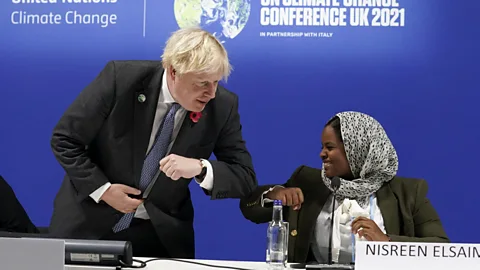 Kevin Lamarque/Getty Images
Kevin Lamarque/Getty ImagesHowe has now finished her second term as future generations commissioner for Wales, and a new appointee will start soon. In her six-year term, she has issued recommendations on everything from a shorter working week and universal basic income to the creation of a national nature service, home energy efficiency measures and developing an education system fit for the future, always with a focus on how to achieve multiple wellbeing benefits in the long term.
The idea also seems to be spreading: Gibraltar now has a similar commissioner, and bills are in development in the UK, Irish and Scottish parliaments. The UN also plans to appoint one. Meanwhile, even the Football Association of Wales has adopted the seven goals from the act to frame its work, with the aim of being the most sustainable football association in the world.
"You wouldn't think it was ground-breaking for a country to have a set of long-term goals," says Howe. "Wherever I go anywhere in the world and I talk about the future generations act, the general response is, 'Oh, my God, like, why doesn't every country have one?' Well, yes, exactly, why doesn't every country have one?"
Taking it to the courts
Howe's role may have the ability to influence policy, but one thing it doesn't have is the power to force governments to act on climate on behalf of future generations. To do that, one has to go through the courts.
In recent years there has been a surge in climate lawsuits aiming to use the legal system to close the gaps on climate change action, many with a focus on the impacts climate change will have on future generations.
In 2021, a case brought by young environmental activists to Germany's constitutional court led to a ruling that the country's current emissions reductions were insufficient to protect future generations.
The ruling noted that "one generation must not be allowed to consume large portions of the CO2 budget while bearing a relatively minor share of the reduction effort, if this would involve leaving subsequent generations with a drastic reduction burden and expose their lives to serious losses of freedom".
Luisa Neubauer, an activist from the campaign group Fridays for Future Germany, was one of the complainants in the case. Speaking to Future Planet shortly after the ruling in 2021, she said it has helped to reshape the understanding of politics in the climate crisis from considering only the costs and benefits to people alive today, to also considering them for future generations. "It lifts politics out of this kind of present addiction it has to the here and now," she says.
Despite the victory though, filing a case against her own government was "not an activity I like to do", Neubauer says. "I don't feel like that should happen. I don't feel like a 23-year-old should have to sue her own government."
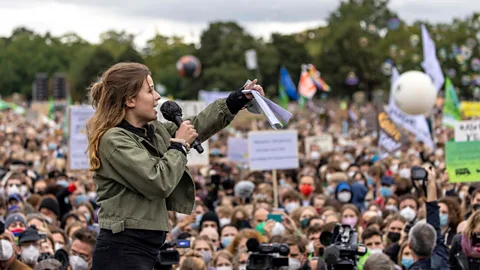 Maja Hitij/Getty Images
Maja Hitij/Getty ImagesOther court cases are taking a similar approach. In the US, young people from Montana have filed a constitutional climate lawsuit claiming that the state is violating their constitutional rights to a clean and healthful environment by supporting a fossil-fuel-driven energy system. With a trial date set for June 2023, it will be the first ever constitutional climate trial in the US – and future generations play an important role in it.
The case has its basis in several bills passed in Montana in 2011 which promote the production and use of fossil fuels, says Phil Gregory, a lawyer working with Our Children's Trust, which provides legal services to the lawsuit and other similar cases in the US and around the world. "Even though the state knows through its own reports that these fossil fuel emissions will destroy the clean and healthy environment Montana had at the time the constitution was passed, for present generations and for future generations."
Grace Gibson-Snyder, a 19-year-old Montana resident, is one of 16 young plaintiffs in the case. "I think this case gives us the opportunity to express our own opinions and experiences freely in a way that we often don't get to," she says.
"There's [also] the pure fact that youth are more impacted by climate change than other age groups. I certainly am worried about the livelihood of future generations and this case is such a wonderful opportunity to protect them from any of those worst case scenarios, and provide them with a cleaner and safer and happier future."
The youth approach
It's no secret that many young people certainly are incredibly concerned about climate change. Studies have found high levels of climate anxiety among youth today. In a 2021 survey of 10,000 16-25-year-olds across 10 countries, 75% agreed that the "future is frightening" due to climate change, while 56% considered that "humanity was doomed".
Sadly, this anxiety is not baseless. A 2021 Science study found children born in 2020 will experience between two and seven times more extreme climate-related events – particularly heat waves – compared with people born in 1960, under current climate policy pledges. Meanwhile, limiting global warming to 1.5C will mean a person born in 2017 can emit only a ninth of the emissions of someone born in 1950 over their lifetime, according to a 2019 analysis by the media outlet Carbon Brief.
All this raises the stakes for youth voices to be heard. "The people who are causing the climate crisis are not the ones who are going to be here to face the worst consequences," says Maria Reyes, a climate activist from Mexico with Fridays for Future Mapa (Most Affected People and Areas), speaking to Future Planet in 2021. "We have to recognise that the voices of young people, especially those from the most affected areas by the climate crisis, are valuable."
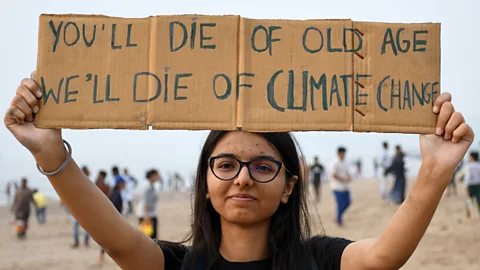 Ashish Vaishnav/Getty Images
Ashish Vaishnav/Getty ImagesNisreen Elsaim is the chair of both the UN Secretary General's Youth Advisory Group on Climate Change and the Sudan Youth Organisation on Climate Change. She also considers youth climate activism essential since "we will be the generation that actually deals with the impacts, the actual hard, harsh, massive impacts of climate change".
Multilateral agreements such as the Paris Agreement are also long-term documents which need to take account of all generations' views, she adds. "Having young people engaging and being part of the process is very important to guarantee that we will not be dealing [in the decades to come] with something that we were not actually part of," she says.
You might also like:
Elsaim has already spent several years in negotiating spaces at UN climate talks and is a frequent speaker at climate events. Even so, she has noticed a tendency to dismiss younger voices.
"[People from older generations] always think that young people belong in the streets, dancing, or having a march or strike, but they don't have the technical know-how to be part of 'serious talks', as they describe it," she says. "Even when they host us in events, they give more time for other speakers than they give for the younger speaker." Even though they are invited more often to events now than previously, young people can also lack the resources to participate fully, she says. She believes previous generations need to admit their fault and responsibility over climate change, support young people more and make room for them at the table.
Between the generations
Many young climate activists feel a similar sense of frustration with their parents' generation. "Somehow, without bad intentions, the boomer generation brought us collectively, and especially led by some industries, into this climate disaster," says Neubauer. "Fridays For Future kicked off when young children realised what future they were facing, and that this was not the happy family future their parents were intending to build for them."
At the same time, many young climate activists also have a strong sense of respect for how knowledge from indigenous cultures and grassroots communities could help bring the world through the climate crisis.
Carbon Count
The emissions from travel it took to report this story were 0kg CO2. The digital emissions from this story are an estimated 1.2g to 3.6g CO2 per page view. Find out more about how we calculated this figure here.
"I think intergenerational climate justice is not only changing the way we communicate the climate crisis, but the way we build relationships with other generations, and with grassroots communities," says Reyes.
Research has shown that indigenous communities and local communities are often especially effective stewards of land and nature, for example by impeding deforestation, which has led to interest in using traditional knowledge more widely in environmental efforts. But the decision-making systems of some indigenous cultures can also support long-term thinking.
One example is seventh-generation decision making, a concept long used by the Iroquois Native American nations for making decisions based on impacts seven generations forward. "We've kind of lost that sort of intergenerational connection in modern Western culture," says Krznaric.
The concept of seventh-generation decision-making has inspired a modern movement in Japan known as "future design". Local people are invited to discuss and draw up plans for the towns and cities where they live, with half representing residents in the present day and the other half asked to imagine themselves as residents from 2060.
"It turns out the residents from 2060 systematically advocate far more transformative plans for their towns and cities, whether it's long-term investment in health care, or long-term action on the climate crisis," says Krznaric.
In fact, citizen assemblies in general are a good model for taking the long view, says Krznaric. "The evidence is there that they take a much longer term perspective than your regular politicians, because they're not tied to the same short-term election cycles."
Ultimately, though, intergenerational justice isn't just about thinking long term, says Krznaric. "It's not just about extending your time horizon forward," he says. "It's not just about time, it's also about place."
He points to biologist and author Janine Benyus who writes about how other species have learned to survive and thrive by taking care of the place that will take care of their offspring.
"I remember when I read that, suddenly, 'boom', it was like a revelation," says Krznaric. "It made me realise if you care about time and future generations, one of the best ways to do it is to care about place today.
"The kind of things that we're doing benefit people today and tomorrow. When it comes to climate justice, there isn't a tension there necessarily."
--
